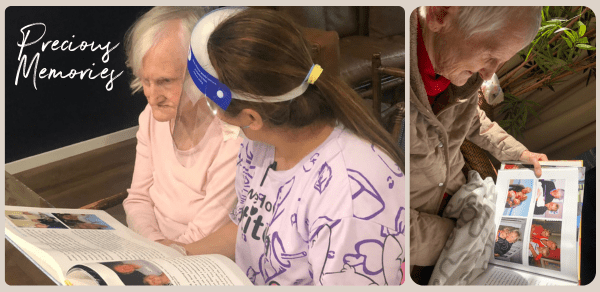Have you heard about memory books? They’re such a beautiful way to help people living with dementia recall happy moments from their past. A memory book is a collection of photos and stories that are close to their heart and can bring a smile to their face. It’s like a time capsule of their life that they can hold onto and cherish forever. Memory books are not just about reliving the good old days; they are also a great way for loved ones and caregivers to connect with them on a deeper level. Sharing their stories creates a sense of bonding and brings them closer to their caregivers. The joy and comfort that come from reminiscing about the past can be incredibly therapeutic for people living with dementia, enhancing engagement, and often lifting their overall mood and well-being.
Family and caregivers can also use memory books to:
- promote pride, self-esteem, and validation
- provide a sense of security when taken to unfamiliar places
- act as a bridge to the past
- orient them to themselves, their identity, and their purpose
- orient them to their families and friends
- facilitate connections between people sharing and reminiscing memories
- offer opportunities to engage and communicate for people who are unable to use speech
You can include many themes in memory books, from key life events to treasured family memories. Here are some suggestions for topics:
- Childhood and adolescence
- Date of birth, names of parents and siblings and their occupations
- Name of their school/university
- Their favourite subjects, teachers and classmates
- Weddings and anniversaries including how they met
- Births of children or grandchildren
- Dates and ‘firsts’
- Family holidays and trips
- Favourite hobbies or pastimes
- Career or work-related achievements
- Important lessons learned in life
- Favourite songs or movies
- Personal style and fashion trends
- Special cultural or religious traditions
- Life-changing experiences or challenge
- Family recipes and beloved foods
- Treasured friendships and relationships
- Beloved pets or animals
- Favourite places or destinations
When creating your memory book, be sure to include captions to help provide some context to the photos and use large font sizes in the text.
Memory books can be a valuable tool for caregivers and loved ones to promote communication, connection, and sharing with individuals living with dementia. It’s essential to approach the conversation with sensitivity and patience, avoiding the urge to quiz or interrupt the person. It’s important to allow them to share their life story in their own time and in their own way, without pressure or rush. Additionally, it’s best to avoid using the phrase “Do you remember?” as this may lead to feelings of sadness or confusion if they are unable to recall a particular memory.
There are many suppliers of Memory Books (Photo Books) some of which are below for your convenience:
Snapfish – https://www.snapfish.com.au/store/photo-book
Milk – https://www.milkbooks.com/photo-books/
Mixbook – https://www.mixbook.com/photo-books
Shutterfly – https://www.shutterfly.com/photo-books/
Photobook – https://www.photobookaustralia.com.au/coupon-codes/best-photobook
By creating a safe and supportive environment for reminiscing, memory books can help individuals with dementia feel validated, heard, and appreciated.
“I have lovely memories of my visits with Grammy, and her memory book played a big part in that. We would look at pictures on “my page,” including ones of us together when I was young. I would read a silly poem I wrote at age seven, and it always made her smile. They were special moments that I’ll always treasure.”
– Connor, Joanie’s grandson






0 Comments